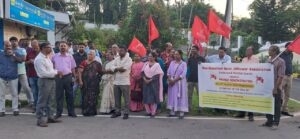
Mass Demonstration Demands Immediate Action on Pay Commission and Pension Reforms
Residents of Sri Vijaya Puram witnessed a significant protest on August 20, 2025, as thousands of government employees and pensioners gathered to demand the establishment of the 8th Central Pay Commission (CPC). Organized by the Non-Gazetted Government Officers’ Association in the Andaman and Nicobar Islands, the demonstration highlighted growing frustrations over stalled reforms and the government’s proposed pension categorization policy. The event, held at the Secretariat premises, drew widespread attention as participants called for urgent action to address systemic issues affecting public sector workers. The protest underscored the deepening concerns among both active and retired employees regarding the delay in implementing critical financial reforms, which have been a long-standing demand for decades.
Leaders Criticize Government for Procrastination and Pension Categorization Policy
Speaking at the protest, Suresh Lall, General Secretary of the A&N Government Pensioners’ Association, condemned the government’s decision to classify pensioners based on their retirement dates, a move he argued would erode the benefits promised by the Pay Commission. The policy, introduced through the Finance Act 2025, has sparked fears among retirees that they may lose entitlements to revised salary structures. Meanwhile, P. Sathyapal, a former association president, accused the central government of inaction, emphasizing that eight months had passed since the announcement of the CPC’s formation in January 2025. He warned that the prolonged delay risks further destabilizing the morale of public sector workers, many of whom have been waiting for equitable compensation for years.
Protesters Demand CPC Implementation and Policy Revisions
The demonstration also focused on the urgent need to finalize the 8th CPC’s recommendations, which are expected to reshape salary scales and pension benefits for millions of employees. R.D. Yadav, Vice President of the NGOs’ Association, reiterated the protesters’ call for the commission to be operationalized by January 2026, stressing that the delay has caused significant financial strain on families dependent on government salaries. D. Ayyappan, a former association leader, criticized the Finance Act’s provisions, arguing that the categorization of pensioners would create inequities and undermine the principles of fair compensation. Protesters emphasized that the proposed changes would disproportionately affect retirees, many of whom rely on fixed incomes for survival.
Event Concludes with Unified Call for Government Accountability
The protest, led by prominent union leaders including Nasreen Begum and P.Jay Murthy, concluded with a vote of thanks by Mr. R. Rajendran, General Secretary of the Association. Participants vowed to continue their demands through sustained protests and legal avenues until the government addresses their grievances. The event highlighted the deepening divide between public sector workers and the administration, with many accusing officials of prioritizing bureaucratic inertia over employee welfare. As the demonstration ended, organizers vowed to escalate their campaign, urging the government to prioritize the needs of its workforce and ensure transparency in policy implementations. The protest has since sparked discussions across the region about the broader implications of delayed reforms on public service morale and economic stability.
Broader Implications for Public Sector Reforms and Employee Rights
The protest in Andaman and Nicobar has reignited debates about the need for systemic reforms in government employment policies. With the 8th CPC’s recommendations pending, the situation underscores the challenges of balancing fiscal responsibility with the rights of public sector workers. The categorization of pensioners has become a flashpoint, with critics arguing that the policy risks creating a two-tier system that disadvantages retirees. As the government faces mounting pressure to act, the protest serves as a reminder of the critical role of employee representation in shaping policy outcomes. The event has also drawn attention to the broader need for transparent communication and timely implementation of reforms to prevent further erosion of trust between the administration and its workforce.




